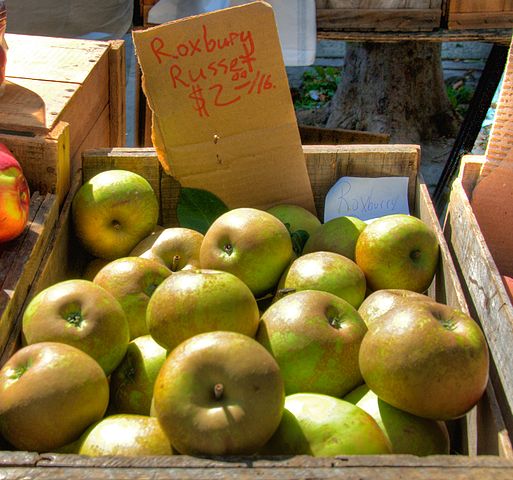Today’s parable in Matthew about false prophets can sound a little obtuse to our 21st century ears. In Jesus’ day, a person couldn’t walk down the street without bumping into folks who claimed to be prophets. It was a form of entertainment, really–and one of the problems at the time of the Gospels was that Jesus was spreading his message in a world where “prophets” were a dime a dozen. Our false prophets aren’t as obvious. Even worse, sometimes we’re the false prophet.
All this talk about fruit got me to thinking about one of the crowning joys of my backyard–my apple tree. I have no idea what kind of apple tree it is–although I do wonder if it isn’t a Roxbury Russet or some close cousin. In the 15 years I’ve lived here, there have only been two years that I haven’t had so many apples I ended up giving away more than I froze or canned in syrup (My friends at church start asking me in late August, “Are you going to be bringing us all bags of apples soon?”). It’s definitely a good tree, despite the fact its owner, is, at best, rather Darwinian as a horticulturist. In fact, it was an unexpected disaster–a windstorm–that saved that tree.
A few years ago, we had a thunderstorm with 70+ MPH straight line wind bursts that uprooted one of my shade trees and took about 1/3 of the limbs off the rest. It was like Mother Nature had decided to prune everything at the 20 foot level–all the limbs on all the trees were broken at around the same height. One of those broken limbs landed in my apple tree. It was in removing that limb from the apple tree I discovered insect damage. The insect damage was about 12 feet up in the tree, and I would never have noticed it from the ground. Luckily, with some pruning and some treatment, it continues to be the abundant over-producer that it is.
No doubt, a good tree is a good tree…but imperceptible things in life can slowly make a good tree go bad. We don’t catch up to it because the insults are usually hidden (like those insects), or we neglect to pay regular attentive care to the tree, or we think, “It’s doing fine, no need for me to do anything other than expect what I always expect from it.” Next thing we know, we have a bad tree on our hands and no fruit, and a bad attitude about the bad tree. (“I knew it was a bad tree all along. I’ve never liked that tree.”)
Had I not discovered the damage, and the tree had started to fail, I know myself well enough that I would have tried to distance myself from it. “It’s not my fault–something’s wrong with that tree. It was already here when I moved to this house. There was something wrong with it from the get-go.”
Ah, and so it is with life. We might have known someone for years–we might even live in the same house with them or share a bed–but we don’t always know the hidden insults in a person’s life. We don’t always say the loving things we’d like to say, or we don’t say them enough. We don’t notice anything awry until the other person failed to perform to our expectations. Too many times, when trouble comes, we distance ourselves from the trouble by putting all the blame on the other person, instead of accept our own mistakes in it–and become false prophets towards a bad outcome. In fact, it often becomes a self-fulfilling prophecy. Once we divest ourselves from the problem, and the bad outcome happens, we’re suddenly the smug retro-prophet–“I knew this was going to turn out bad”–another form of false prophecy.
So what’s the solution? Our Apocrypha reading from Wisdom today offers some clues.
“The generative forces of the world are wholesome,and there is no destructive poison in them,and the dominion of Hades is not on earth. For righteousness is immortal.”
The wisdom we gain from following the path of a disciple of Christ, although fraught with painful mistakes and hard life lessons, teaches us to choose God’s restorative option over our destructive one. In short, it’s probably best to assume we’re starting with a good tree rather than a bad one, and work from there.
When was a time in your life that it took a windstorm to discover damage to a “good tree” in your life? How can each of us, with God’s help, not fall prey to becoming our own worst false prophet, in times of trouble.
Maria Evans, a surgical pathologist from Kirksville, MO, is a grateful member of Trinity Episcopal Church and a postulant to the priesthood in the Episcopal Diocese of Missouri. She occasionally finds time to write about the obscurities of life, medicine, faith, and the Episcopal Church on her blog, Kirkepiscatoid.
Image: “Roxbury Russet” by Ed Yourdon – originally posted to Flickr as Return to the farmer’s market, Sep 2009 – 52. Licensed under CC BY-SA 2.0 via Wikimedia Commons

